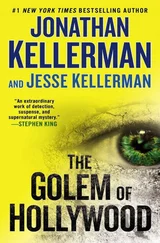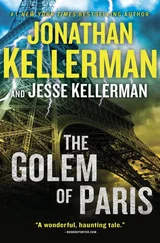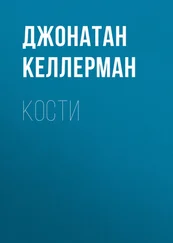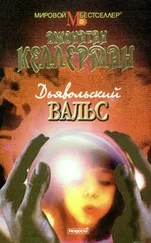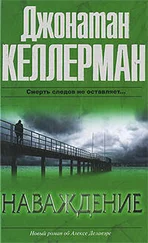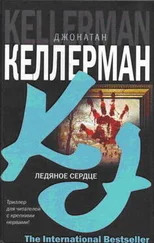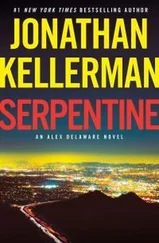He finished his drink and motioned for another. It came and he gulped down half.
A waitress skittered over on geisha feet and handed us hot towels. We wiped our hands and face. I felt my pores open, hungry for air.
“You should be pretty good at talking to teachers, right? Probably did a lot of it back in the days when you were earning an honest living.”
“Sometimes teachers hate psychologists, Milo. They see us as dilettantes dropping theoretical pearls of wisdom on them while they do the dirty work.”
“Hmm.” The rest of the Scotch disappeared.
“But no matter. I’ll talk to her for you. Where can I find her?”
“Same school Gutierrez taught at. In West L.A., not far from you.” He wrote the address on a napkin and gave it to me. “Her name’s Raquel Ochoa.” He spelled it, his voice thickening, slurring the words. “Use your badge.” He slapped me on the back.
There was a grating sound above our heads. We looked up to find the sushi chef smiling and sharpening his knives.
We ordered. The fish was fresh, the rice just slightly sweet. The was abe horseradish cleared my sinuses. We ate in silence, against a backdrop of satnisen music and foreign chatter.
I awoke as stiff as if I’d been spray-starched; a full-fledged charley horse had taken hold of my muscles, a souvenir of my dance with Jaroslav. I fought it by taking a two-mile run down the canyon and back. Then I practiced karate moves out on the rear deck, to the amused comments of a pair of mockingbirds who interrupted their domestic quarrel long enough to look me over, then delivered what had to be the avian equivalent of a raspberry.
“Fly down here, you little bastards,” I grunted, “and I’ll show you who’s tough.” They responded with hilarious screeching.
The day was shaping up as a lung-buster, grimy fingers of pollution reaching over the mountains to strangle the sky. The ocean was obscured by a sulfurous sheath of airborne garbage. My chest ached in harmony with the stiffness in my joints, and by ten I was ready to quit.
I planned to time my visit to the school where Raquel Ochoa taught for the noon break, hoping to find her free. That left enough time for a long, hot bath, a cold shower, and a carefully assembled breakfast of eggs with mushrooms, sourdough toast, grilled tomatoes and coffee.
I dressed casually in dark brown slacks, tan corduroy sport coat, checked shirt and brown knit tie. Before I left I dialed a now-familiar number. Bonita Quinn answered.
“Yes?”
“Mrs. Quinn, Dr. Delaware. I just wanted to call to find out how Melody’s been doing.”
“She’s fine.” Her tone would have frosted a beer mug. “Fine.”
Before I could say more she hung up.
The school was in a middle-class part of town, but it could have been anywhere. It was the old familiar layout of citadels of learning throughout the city: flesh colored buildings arranged in classic penitentiary style, surrounded by a desert of black asphalt and secured by ten-foot-high chain link fencing. Someone had tried to brighten it up by painting a mural of children playing along the side of one of the buildings but it was scant redemption. What helped a bit more were the sight and sound of real children playing – running, jumping, tumbling, chasing each other, screaming like banshees, throwing balls, crying out with the fervor of the truly persecuted (“Teacher, he hit me!”), sitting in circles, reaching for the sky. A small group of bored-looking teachers watched from the sidelines.
I climbed the front stairs and found the main office with little trouble. The internal floor plan of schools was as predictable as the drab exterior.
I used to wonder why all the schools I knew were so hopelessly ugly, so predictably oppressive, then I dated a nurse whose father was one of the chief architects for the firm that had been building schools for the state for the past fifty years. She had unresolved feelings about him, and talked a lot about him: a drunken, melancholic man who hated his wife and despised his children more, who saw the world in terms of minimally varying shades of disappointment. A real Frank Lloyd Wright.
The office reeked of mimeographing fluid. Its sole occupant was a stern, black woman in her forties, ensconced in a fortress of scarred golden oak. I showed her my badge, which didn’t interest her, and asked for Raquel Ochoa. The name didn’t seem to interest her either.
“She’s a teacher here. Fourth grade,” I added.
“It’s lunchtime. Try the teachers’ dining room.”
The dining room turned out to be an airless place, twenty feet by fifteen, into which folding tables and chairs had been crammed. A dozen men and women sat hunched over sack lunches and coffee, laughing, smoking, chewing. When I entered the room all activity ceased.
“I’m looking for Ms. Ochoa.”
“You won’t find her here, honey,” said a stout woman with platinum hair.
Several of the teachers laughed. They let me stand there for a while and then a fellow with a young face and old eyes said:
“Room 304. Probably.”
“Thanks.”
I left. I was halfway down the hall before they started talking again.
The door to 304 was half-open. I went in. Rows of unoccupied school desks filled every square inch of space, with the exception of a few feet at the front that had been cleared for the teacher’s desk, a boxy metal rectangle behind which sat a woman busy at work. If she had heard me enter she gave no indication, as she continued to read, make checkmarks, cross out errors.
An unopened brown bag sat at her elbow. Light streamed in through dusty windows in beams that were suffused with dancing, suspended particles. The Vermeer softness was at odds with the utilitarian severity of the room: stark white walls, a blackboard veneered with chalky residue, a soiled American flag.
“Ms. Ochoa?”
The face that looked up was out of a mural by Rivera. Reddish-brown skin stretched tightly over sharply defined but delicately constructed bones; liquid lips and melting black eyes gabled by full, dark brows. Her hair was long and sleek, parted in the middle, hanging down her back. Part Aztec, part Spanish, part unknown.
“Yes?” Her voice was soft in volume but the timbre was defensively hard. Some of the hostility Milo had described was immediately apparent. I wondered if she was one of those people who had turned psychological vigilance into a fine art.
I walked over to her, introduced myself and showed her the badge. She inspected it.
“Ph.D. in what?”
“Psychology.”
She looked at me with disdain.
“The police don’t get satisfaction, so they send in the shrinks?”
“It’s not that simple.”
“Spare me the details.” She returned her eyes to her paperwork.
“I just want to talk to you for a few minutes. About your friend.”
“I told that big detective everything I know.”
“This is just a double-check.”
“How thorough.” She picked up her red pencil and began slashing at the paper. I felt sorry for the students whose work was coming under scrutiny at this particular moment.
“This isn’t a psychological interview, if that’s what you’re worried about. It’s–”
“I’m not worried about anything. I told him everything,”
“He doesn’t think so.”
She slammed the pencil down. The point broke.
“Are you calling me a liar, Mr. Ph.D?” Her speech was crisp and articulate but it still bore a Latin tinge.
I shrugged.
“Labels aren’t important. What is, is finding out as much as possible about Elaine Gutierrez.”
“Elena,” she snapped. “There’s nothing to tell. Let the police do their job and stop sending their scientific snoopers around harassing people who are busy.”
Читать дальше



